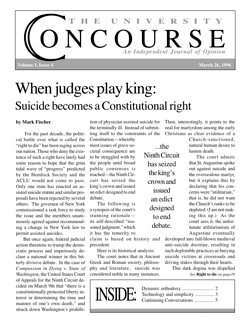Rock music and Catholic culture
by Michael H. Smith
Hey, man! ( Thump—thum-m-m-h-h!) a, you know, like, (Thump—thum-m-m-h-h!) totally, like, awesome (Thump—thum-m-m-h-h!) first issues of (Thump-thum-m-m-h-h!) Concourse! Whoops—had to turn off the rock-n-roll!
It’s really hard to write—let alone speak or think clearly with that idiot noise going on! But the banality of rock music is what most of those born after 1940 were raised—even force-fed—on, to the exclusion of good music. We have, therefore, a generation which has mostly lost the ability to appreciate the gentle, the soft and the beautiful. Instead we have an increasingly mind-numbed, deafened and blinded populace; blind to what they’ve lost in beauty and freedom; blind to decency; blind to their own faults and their own sinful path to destruction.
Perhaps the most distressing aspect of the continuing discussion of rock vs. real music is the fact that we are seriously discussing the artistic value of different forms of rock music among the most brilliant minds at Franciscan University. It is analogous to wine connoisseurs comparing the ambiance of Mogn David 20-20 with Richard’s Wild Irish Rose; or artists comparing the puerile dabblings of the insane Picasso to the works of Jackson Pollock.
Even the best of modern music is, like modern art, simplistic, often mind-numbing and often immoral. Somebody the other day actually said that Elton John would go down in history as another Mozart. Hah! While we’re at it, let’s compare the Beatles to Bach! The complexity of even Thirties and Forties big band music required a discipline that few today could master. The best that can be said of rock is that some rock is not as twisted as other rock—it can hardly be compared with the music of the past.
The dumbing down to depravity of America is definitely the devil’s doing—and rock music must take its share of the blame for the reduced ability to appreciate (or even think about) the finer things. Don’t get me wrong. It is legitimate to enjoy some modern music along with other simple pursuits; but let’s not confuse the merely entertaining with the intrinsically good.
Mary McElwee makes a good and similar point in the second issue of the Concourse with her comments on modern architecture. Today’s America can no longer produce architectural products with the complexity and craftsmanship which were hallmarks of Western culture until modern times. In the “bad old days,” intact Steubenville families could live within walking distance of work and Church, in a house with real oak banisters and trim made of real and wide boards—and go to Mass at St. Peter’s. Today we have houses with cardboard walls, plastic siding with shabby facades, which are either devoid of character and warmth or else done up with phony and poorly proportioned “classical” detail. And the shabbiness of today’s homes pales in comparison to the desecration of our churches into things that more closely resemble caves or factories than the cruciform cathedrals of old.
All around us today we see disappearing in Steubenville architectural detail which common, everyday workmen used to produce for other common, everyday workmen to enjoy in their homes—thousands of them in a city now starting to resemble Mogadishu. This degradation is the outcome of our modern, debased culture of which modern music is one part.
All of these things conspire to drive out reverence, appreciation of beauty and the ability to think clearly in a culture that desperately needs reverence, thoughtfulness, and beauty. Von Hildebrand makes the case for the Tridentine Mass as a case for reverence in The Charity of Anathema. It is hard to be reverent with the banal. We have today an irreverent culture of idiots who must be told that it is dangerous to stand on the top step of a ladder—one third of whom can no longer even read that warning label (nor read their useless government-school diplomas.) We have idiots who sit in front of TV and who look for (when they care at all) quick fixes to their problems—problems they blame universally upon others; problems they demand that government-their-god fix.
Those of us who still have the capacity to appreciate it must try to recapture the art and music of the past (we are not presently able as a culture to produce any worthy music or art of our own!) and pass it on to our children. All of this makes a core curriculum in our Western culture more important than ever. We are indeed a “light upon a hill” but our mission is daunting. Only prayer that supports us in our sure knowledge that Jesus Christ is King makes all things possible.
Michael H. Smith, (Non-traditional) Freshman, Political Science major.


